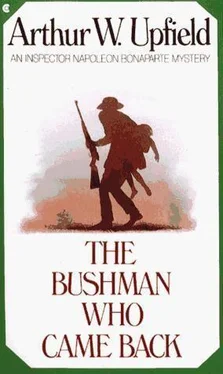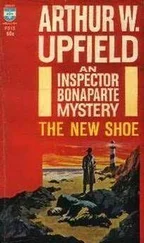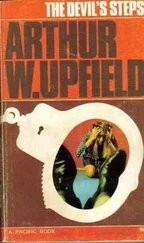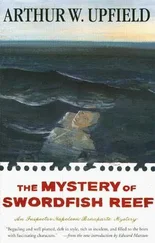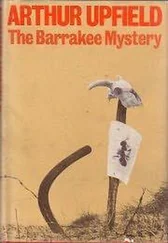Arthur Upfield - The bushman who came back
Здесь есть возможность читать онлайн «Arthur Upfield - The bushman who came back» весь текст электронной книги совершенно бесплатно (целиком полную версию без сокращений). В некоторых случаях можно слушать аудио, скачать через торрент в формате fb2 и присутствует краткое содержание. Жанр: Классический детектив, на английском языке. Описание произведения, (предисловие) а так же отзывы посетителей доступны на портале библиотеки ЛибКат.
- Название:The bushman who came back
- Автор:
- Жанр:
- Год:неизвестен
- ISBN:нет данных
- Рейтинг книги:4 / 5. Голосов: 1
-
Избранное:Добавить в избранное
- Отзывы:
-
Ваша оценка:
- 80
- 1
- 2
- 3
- 4
- 5
The bushman who came back: краткое содержание, описание и аннотация
Предлагаем к чтению аннотацию, описание, краткое содержание или предисловие (зависит от того, что написал сам автор книги «The bushman who came back»). Если вы не нашли необходимую информацию о книге — напишите в комментариях, мы постараемся отыскать её.
The bushman who came back — читать онлайн бесплатно полную книгу (весь текст) целиком
Ниже представлен текст книги, разбитый по страницам. Система сохранения места последней прочитанной страницы, позволяет с удобством читать онлайн бесплатно книгу «The bushman who came back», без необходимости каждый раз заново искать на чём Вы остановились. Поставьте закладку, и сможете в любой момент перейти на страницу, на которой закончили чтение.
Интервал:
Закладка:
Arthur W. Upfield
The bushman who came back
Chapter One
A Beginning for Linda
THEDAYwas the 7th of February, and it was just another day to Linda Bell. Of course, the sun was blazing hot at six in the morning, another morning when the wind sprang up long before six and was a half gale when the sun rose. It sang when crossing the sandy ground, and roared farewell as it sped through the line of pine trees guarding the Mount Eden homestead from the sprawling giant called Lake Eyre.
For Linda this day began like all other days. First she slipped from bed and gazed at the large calendar on the wall above the dressing-table. Later she would be asked to name the day, and already she knew that to remember it would be conducive to happiness.
Linda was most self-dependent although she was only seven years old. She needed no rousing, no instructions on how to begin a new day. Taking a towel from a rack, she tripped daintily through the openfrench windows to the veranda, and along the covered way to the shower recesses. She sang a little song to the accompaniment of the wind under the iron roof as the tepid water from the great tanks high above the ground sluiced down her white body. Now and then into the song crept the word ‘seven’, and the same word occurred when she was still singing, on regaining her room and proceeding to dress. She was making her bed when the breakfast gong without defied the wind, to call the Boss and the Hands.
The homestead kitchen was large, already hot, filled with the aroma of coffee, frying mince-balls, and grilling steaks. At one end stood the small table where Linda and her mother ate, and at the other end was the annexe in which the men ate. The men appeared and sat at the long table, and Mrs Bell asked each what they chose, and served them. That done, she served a cereal to Linda without consulting her, and then carried Mr Wootton’s breakfast tray to the inner dining-room.
Mrs Bell was plump, fair, thirty, and pleasing to behold. It was said that her husband was a horse trainer, and that she had once been a school teacher. She believed that children were no different to horses-that they needed to be trained with firmness and kindness, and that if training is left too late, the child becomes a useless adult, precisely as belated training is wasted effort on a horse or a working dog. Thus she spared herself no trouble, but saved herself much worry.
“You have done your hair nicely this morning, Linda,” she observed as she sat at table with her daughter. “Saves time to do it nicely in the first place. What is the date today?”
“February Seven, One Nine Five Seven,” intoned Linda, her grey eyes wide and faintly impish.
“That’s my girl,” approved Mrs Bell. “Mr Wootton says he’s going to town today, and I see that your comb has lost two teeth. What colour would you like the new one to be?”
Linda chose blue, but her mind was on the slight noises made by the hands leaving the meal annexe. Her mother asked her to tell the time by the wall clock.
Hurrying now to finish her breakfast, Linda’s jaws slowed while she gazed at the clock. Then she guessed a little, as she always found it difficult to be sure whether before or after the hour. This morning she guessed correctly by answering:
“Seven minutes to seven, mother.”
“Good for you, Linda. Now I suppose you want to run out to see the men off to work. Well, you may go. When the men have left, come in and do your lessons. It’s going to be a nasty day, and we’ll get through as quickly as you’ve a mind to, shall we?”
The homestead buildings at Mount Eden formed the sides of a large square. The main house occupied the east side, the men’s quarters the side opposite. On the flanks were the office and store shed, the horse yards, the trade shops, the well and reservoir tanks. In the corner of the square was a round house, constructed entirely of canegrass.
When, a trifle too hurriedly, Linda said grace and skipped from the kitchen, she stepped right into the open square. Already the early morning shadows were deepening in sharp contrast with the sunlit ground, and squadrons of dust horses ridden by riders of the west wind were racing from the men’s quarters to the house, passing by and speeding up the slope to the line of pine trees and the vast open Lake Eyre beyond them.
The men were coming from the quarters to receive their orders for the day. There were four, all white men. Three wore spurs on their riding boots. One was a heavy man, two were lean, and the fourth a young man darkly handsome, and, compared with the others, almost flashily dressed in the ultra-stockman style.
They halted just outside the office door. The young man waved to Linda, and the big man called the morning greeting. Then Mr Wootton appeared from the house side veranda. He was short and stout, red of face, when the complexion of his men was uniformly nigger-brown. His clipped moustache was dark. His hair was worn short and was plainly grey at the temples. His eyes were small and distinctly green, and always kindly for Linda. To her he was the Big Boss, the King of Mount Eden. Unfailingly he must be called ‘Mister Wootton’. Invariably he wore a soft-collared shirt and a tie, gabardine trousers and shoes, instead of riding boots.
As usual, Mr Wootton slipped a key into the office door lock and entered. He was invisible for two to three minutes and Linda knew he was studying a big book kept on his desk, and knew, too, that he looked into the book to tell him all about the station, and what needed to be done. On reappearing, he stood in the doorway and called for Arnold.
Arnold was the very large man who could do anything from blacksmithing to making a motor engine go. Because of the wind and the cawing of passing crows, Mr Wootton had to speak loudly.
“Want anything from town today, Arnold?” The big man shook his head, saying:
“Don’t think so, Mr Wootton. Not for the station, anyway.”
“All right. The wind oughtn’t to be strong out at Boulka. You might take the truck and go for another load of iron. And take your time to get the iron off without tearing holes in it. You know.”
“Good enough,” drawled Arnold, and Linda asked:
“May I go with Arnold, Mr Wootton?”
“If your mother says so,” he assented, and called Eric.
Linda raced to the house. Eric was lanky, raw-boned, slow. When Linda returned he was saying:
“Themud’ll keep ’emfrom crossing for another six weeks even if it don’t rain, whichain’t likely. Them steers know enough to shy off getting themselves bogged. ’Sides, before the lake is hard enough to take ’em, the floodoughta be right down the Coopers and the Georgina, an’ spilling over from the Diamantina.”
“Could be, Eric,” agreed Mr Wootton. “Well, take a ride out to Number Fourteen and look over the stores. Anything you want from town today?”
Eric chuckled dryly, and winked at Linda.
“Well,” he drawled, “you might bring me a box of them lollies with the nuts on ’em. Seems like I got to give a present to my girl. Must keep in with her, y’know.”
“Yes, you must get a present for your sweetheart,” agreed Mr Wootton, seriously. “Is her name Linda, by any chance?”
“That’stellin ’, Mr Wootton,” and again the wink which produced beaming adoration in the little girl’s face.
The next man called to receive orders was the young man named Harry. He came forward with rolling gait, and even the wind could not drown the tinkle of his spurs. He was sent out to ride a section of the boundary fence. The fourth man, named Bill, was instructed to ride into White-Gum Depression and report on the feed. To him Mr Wootton put questions concerning the aborigines.
Читать дальшеИнтервал:
Закладка:
Похожие книги на «The bushman who came back»
Представляем Вашему вниманию похожие книги на «The bushman who came back» списком для выбора. Мы отобрали схожую по названию и смыслу литературу в надежде предоставить читателям больше вариантов отыскать новые, интересные, ещё непрочитанные произведения.
Обсуждение, отзывы о книге «The bushman who came back» и просто собственные мнения читателей. Оставьте ваши комментарии, напишите, что Вы думаете о произведении, его смысле или главных героях. Укажите что конкретно понравилось, а что нет, и почему Вы так считаете.
